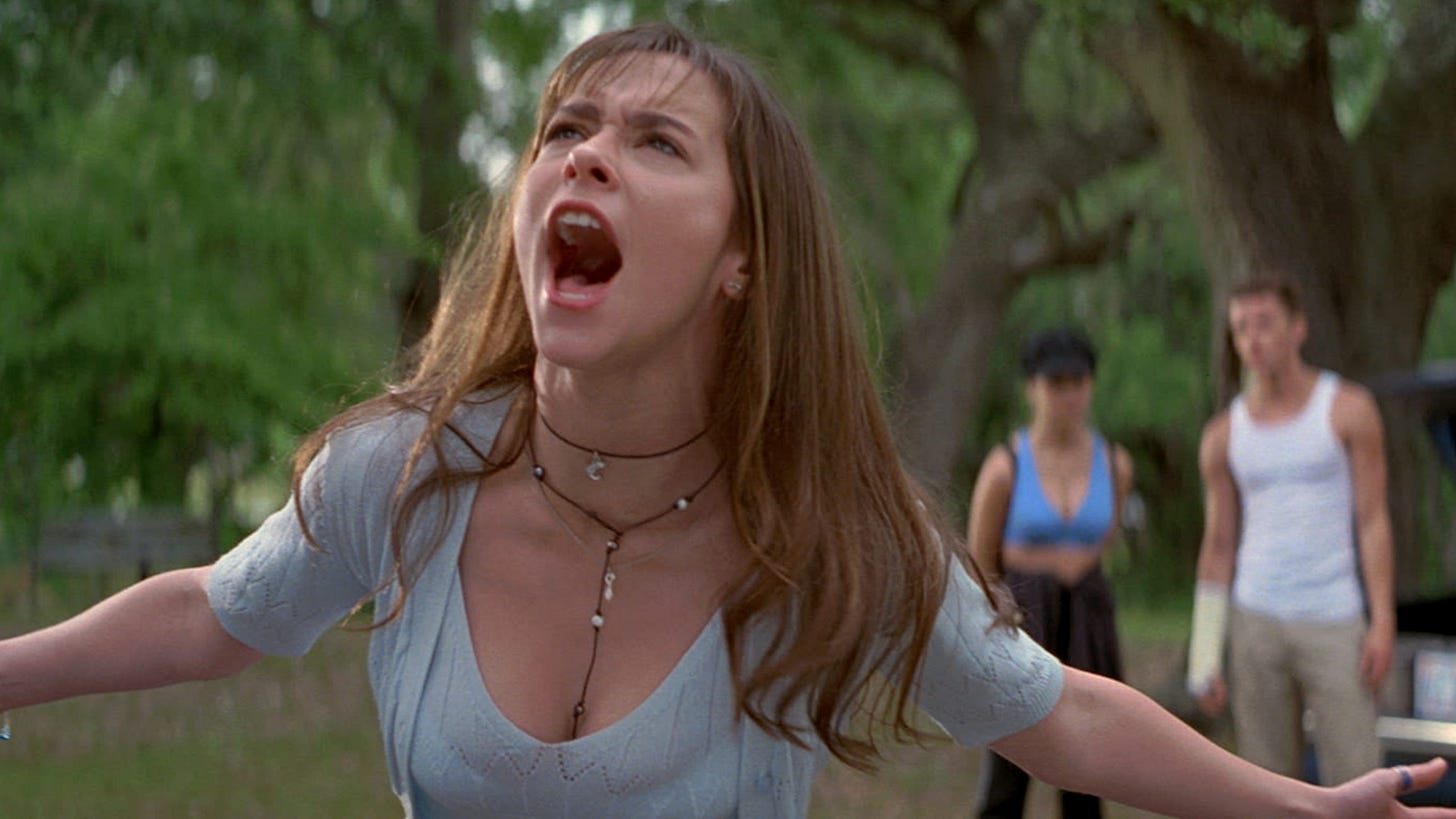Notes on “I Know What You Did Last Summer”
Dispatch from Paris. Written mostly on the plane to Paris.
My father was a fisherman;
My mama was a fisherman’s friend;
And I was born in the boredom and the chowder.
Paul Simon, “Duncan”
When I started watching the film, I thought something snide like: You know, I watch bad movies so rarely, all the clumsiness here is kind of a relief. But I don’t know. Is I Know What You Did Last Summer a bad movie? Sure, there are, from the outset, the usual slasher movie fumbles: the unmotivated, uncharacteristic, and deeply stupid decisions the characters make; the flat and sometimes inconsistent stereotypes they inhabit; the academic calendar that has summer ending just after the Fourth of July; the action maneuvers that defy the laws of physics and/or anatomy and/or basic life function. But these failures, which many of my generation, including myself, learned to identify from CinemaSins before we had actually watched any slasher flicks, are not absolute failures but failures of realism merely. And I Know What You Did Last Summer is not really an exercise in realism, is it? It is a play on the experience of late adolescence: perhaps specifically on the experience of late adolescence as it has been peculiarly structured in modern, economically developed societies, where it is both separated from adulthood and constructed into a world all its own, a world that one leaves rather abruptly shortly after eighteen, when one graduates high school. There is a sense of highly artificial romance in the lives of high school students (adult life, juxtaposed against it, becomes called the “real world”), and I would bet that nearly every high school student in the United States, whether they have listened to “Scenes from an Italian Restaurant” or no, knows all about cold beer and hot lights—and knows as they are experiencing these things that they exist ready-made, as it were, to be song lyrics. Nothing is more easy than to state the subject of I Know What You Did Last Summer, which is that to be in high school, and especially to be nearing the end of high school, is to be keenly aware of the precarity of one’s present existence and filled with fear that something, sooner or later and probably sooner, will happen that will cause the world of sweet romantic teenage nights to blow up and so force oneself to grow up.
Or, worse, force oneself not to. At film’s beginning, Julie (Jennifer Love Hewitt) laments the end of her adolescence and exclaims that she hates the prospect of leaving her high school sweetheart for college, fearing that leaving him in this small sense will lead to leaving him in the larger sense. She seems to wish she could be sealed in this perfect pre-college moment forever. Yet the tragic fate that befalls her and her friends is precisely this. How much better if Julie did, according to the natural course of things, dump Ray (Freddie Prinze, Jr.) over Thanksgiving and never see him again! Instead, she must return to the same friend group, and she is left at film’s end wrapped—or trapped—once again in Ray’s arms, with the kind of “I love you” that could only come from an actor who would go on to marry his onscreen love interest’s co-star. When she cries out, about an hour into the 101-minute film, “I want my life back!” it is the wrong desire. She should not want restored what she had: she should want promised what awaits.
The “last” in the film’s title serves two functions: the titular summer is both the previous summer relative to most of the film’s action and the final one of its characters’ adolescence—or it would be the final one if their development were not so arrested. It is a film in which a “last summer” in this second sense is frozen; and romantic as a last summer feels while one is living it the first time, the last summer as an institution is not built to last. When one is frozen inside it, one finds oneself excavating one’s childhood and therefore entering the realm of the gothic (it is not a coincidence that this major entry in the slasher canon takes place in the South), where all one can do to distract oneself from the pain of confronting history is place familiar figures in new sexual configurations until one is face to face with those two great gothic mainstays, homosexuality and incest.
Neither of which the movie can actually confront—as the Fourth-of-July setting reminds us, it is a consummately American picture—which may be why I Know What You Did Last Summer is not, finally, a good movie. Its last plot twists are unpredictable in the bad sense that they could not possibly be predicted on the basis of what precedes them. This is poor form. Still, it captures that fear of and desire for arrested development that is the purview of the American eighteen-year-old; in its own way, and we do a discredit to ourselves if we ignore it, it is the slasher Last Picture Show.


